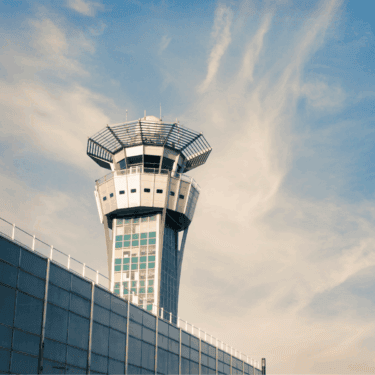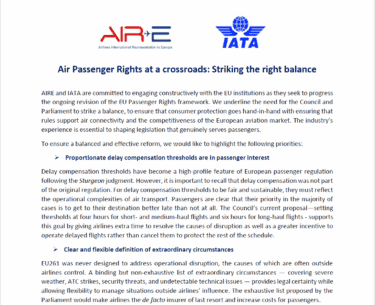Airlines International Representation in Europe supports the revision of the Air Services Regulation as it aims to enhance sustainability, resilience, and social responsibility in aviation. The changes should contribute to future-proof the sector while preserving connectivity, competition, and high-quality jobs, and improving the financial resilience of air carriers. Key areas under consideration include Public Service Obligations (PSO), leasing practices, financial conditions, ownership and control assessments, and competitiveness.
1. Financial and regulatory resilience
1.1. Proportionate financial fitness requirements
AIRE cautions against imposing overly stringent capital requirements that could undermine airlines’ access to investment, particularly from foreign sources. Instead, it supports proportionate measures that enhance financial resilience without deterring capital flows.
In extraordinary circumstances such as war or major crises, mechanisms must be in place to ensure a level playing field across all Member States.
Point 8 of the Rules on Ownership and Control of EU air carriers highlights that a central objective of the Aviation Strategy for Europe, adopted by the Commission in 2015, is to ensure the competitiveness of the European aviation sector.
Therefore, AIRE supports greater flexibility in ownership structures—such as differentiated share classes (e.g. Class A and B shares)—which allow foreign investment without conferring control or effective ownership, thereby maintaining compliance with EU ownership and control rules while improving access to global capital.
1.2. Liberalization of short-term wet leasing from third countries
AIRE advocates for a more flexible approach to short-term1 wet leasing arrangements involving non-EU carriers, particularly those certified under internationally recognized safety standards such as EASA or IOSA.
Enabling access to a broader leasing market could enhance operational flexibility, stimulate competition, and encourage innovation within the EU aviation sector, while maintaining high safety and compliance standards.
Please find below the following list of recommendations:
Proposal for a centralized approval system:
Instead of each Member State handling wet-lease applications separately, a centralized digital platform—for instance, coordinated by EASA—would streamline the process and reduce uncertainties.
Establishment of a pre-approved carrier list for short-term wet leasing:
A list of non-EU carriers that are IOSA/EASA-certified, ICAO-compliant, and not on the EU blacklist could be created. This would enable faster and simplified approval procedures for short-term wet-lease requests involving such carriers.
Cooperation on safety oversight:
To ensure consistent safety assessments of both EU and non-EU operators, a mutual recognition framework or safety agreement between authorities would be beneficial.
1.3. Intra-EU wet leasing: streamlining approval requirements
The current requirement under ORO.AOC.110 for prior approval of any wet lease-in, including between EU AOC holders, imposes unnecessary administrative burdens without contributing to improved safety. Since all intra-EU operators are subject to harmonised EASA oversight, these approvals should not be required.
We recommend that the revision of Regulation 1008/2008 explicitly exempt intra-Community wet leasing from such approvals, replacing them with a simple notification system. This would reduce regulatory fragmentation among NAAs and support more efficient, flexible operations within the EU single aviation market.
1.4. Mitigating disruptions from ATC strikes through coordinated EU action
AIRE strongly supports a harmonized EU approach to address the disproportionate impact of air traffic control (ATC) strikes, particularly on overflights that do not originate or terminate in the affected Member State.
To ensure the continuity and reliability of air services across the Single European Sky, AIRE advocates for the coordination of high-level ATC functions under a centralized European authority, which would enhance resilience, minimize fragmentation, and protect the integrity of the internal aviation market.
1.5. More flexible Public Service Obligation (PSO) rules
AIRE is generally positive about potential reforms that could enhance the flexibility of Public Service Obligation (PSO) regulations, which are designed to guarantee essential air services to remote or underserved regions.
Additional consideration should be given to making the provisions on possible changes to PSO during its term more flexible in the event of unforeseen situations, force majeure – e.g. renegotiation of the contract, the possibility of suspending the service or extending the termof the contract for the duration of the extraordinary circumstances. National authorities and the Commission should be able to respond to emergency situations in a sufficiently efficient and timely manner. For example, in the face of a sudden and significant drop in air traffic, EU countries should be able to adapt to the situation urgently and introduce a public service obligation in order to ensure basic connectivity and security of supply.
It should be noted that the provisions on PSO are of a very general nature and have not been explained in detail in the Regulation. Proper implementation of these provisions in all Member States should also be sought.
All tender documentation related to Public Service Obligations (PSOs) must be provided either in the official language of the Member State concerned or in a harmonized English translation to ensure they are accessible and clearly understood by all relevant parties.
2. Competitiveness safeguards
2.1. Revising ownership and control rules to attract global investment
AIRE supports a targeted reform of the EU’s ownership and control requirements to allow greater flexibility in attracting international capital, while maintaining effective regulatory oversight.
In light of the significant investment needed to meet the sector’s decarbonisation objectives, expanding access to non-EU funding sources is critical. Revising these rules—while preserving EU strategic interests—would enhance the competitiveness and financial sustainability of European carriers.
3. Environmental flight bans and sustainability tools
3.1. Opposition to short-distance flight bans
AIRE opposes short-distance flight bans; particularly where viable rail alternatives do not exist. Such measures often ignore the essential role of air connectivity in regional cohesion and economic activity. They can disproportionately impact communities and businesses without delivering meaningful environmental benefits.
AIRE advocates for a balanced, evidence-based approach that supports long-term decarbonization and promotes intermodal solutions rather than imposing restrictive, short-sighted measures.
3.2. Traffic right restrictions as an environmental tool
AIRE questions the effectiveness of using traffic right restrictions to achieve environmental goals. With the EU’s Fit for 55 package already imposing ambitious and binding climate measures on aviation, additional restrictions risk being redundant and may create market distortions.
Instead, efforts should focus on supporting the implementation of existing measures and fostering innovation in sustainable aviation.
3.3. Clarification of the concept of ´´serious environmental measures´´ as stated in art. 20 of the Air Services Regulation
Providing a more explicit definition of these problems within the regulation would help ensure that Article 20 is applied in a clear, consistent, and legally sound manner.
It is important to note that using environmental problems—particularly those beyond the control of airlines—as grounds to restrict operational rights may jeopardize the economic sustainability of the aviation sector.
4. Labour law enforcement
4.1. Concerns about restrictions on employment forms
AIRE strongly opposes regulatory measures that limit the use of diverse employment models in aviation. Such restrictions risk increasing operational costs without contributing to safety or social protection. Employment regulations should respect the freedom to choose lawful employment forms and avoid disrupting established business models or operational flexibility.
The level of safety is not dependent on the form of employment, among other things because the provisions on the working time of crew members apply regardless of the form of cooperation they have with the carrier, as evidenced by the regulations adopted from the level of Regulation 965/2012 (Annex III, ORO.FTL). We do not find any objective materials indicating the dependence of aviation safety on the form of employment. This is confirmed, among others, by the report on the interdependence between socio-economic factors and civil aviation safety prepared in 2022 by EASA, stating that “the reports and data used by the Agency do not show a correlation between employment and working conditions and the level of safety”.
The freedom to choose the form of employment is part of the freedom to provide services and should not be restricted.
4.2. Call for legal clarity and consistent enforcement of labour law for aircrews
AIRE supports initiatives aimed at clarifying jurisdictional responsibilities and enhancing coordination among Member State authorities.
Clear and consistent enforcement is essential to ensure fair competition across the EU aviation market and to safeguard the rights and safety of aircrews—particularly in situations involving unruly passengers or cross-border legal uncertainties.
4.3. Opposition to administrative burdens
While supporting fair labour standards, AIRE cautions against creating complex compliance requirements that disproportionately burden airlines.
5. Transparency and consumer information
Harmonized consumer rules: AIRE supports the harmonization of consumer protection rules across Member States to build passenger trust while reducing regulatory fragmentation. Consistent, EU-wide standards would improve legal certainty and simplify compliance for airlines operating across multiple jurisdictions.
To ensure clarity and fairness, AIRE proposes establishing a minimum level of passenger protection and services that must be included in the lowest fare offered by airlines, such as transparent pricing.


